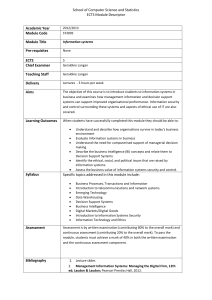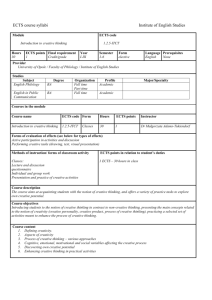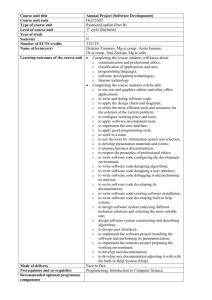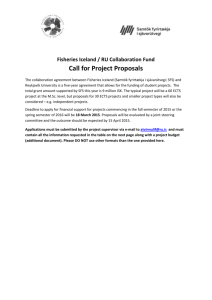MA Module 9 - Institute of English, Opole University
advertisement
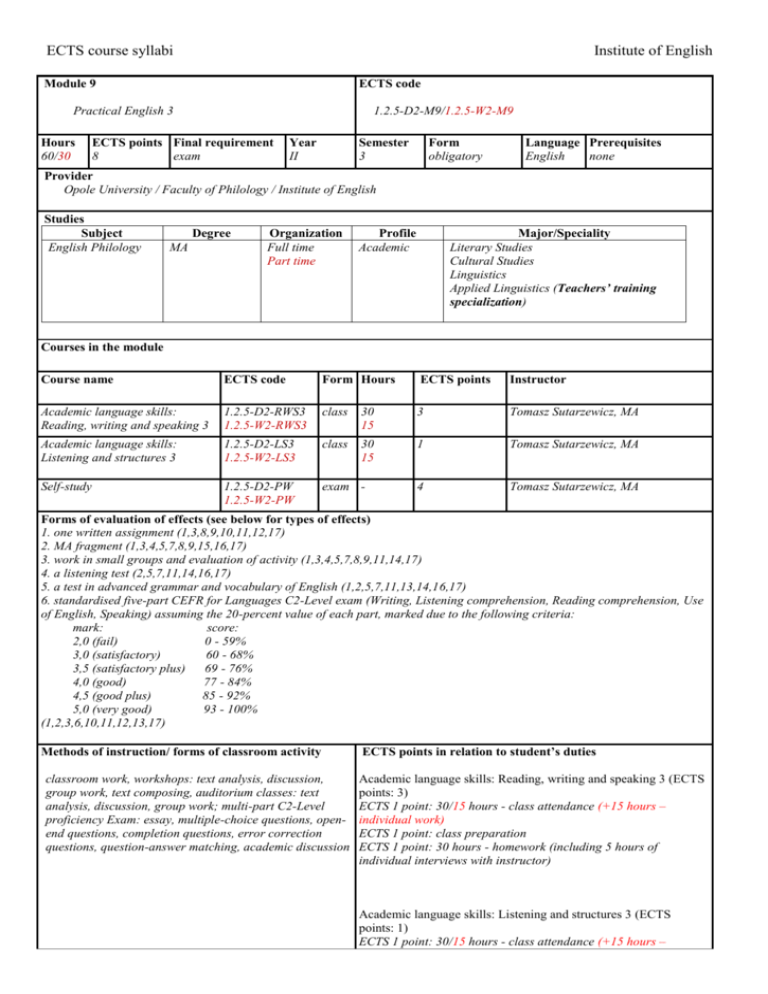
ECTS course syllabi Institute of English Module 9 ECTS code Practical English 3 Hours 60/30 1.2.5-D2-M9/1.2.5-W2-M9 ECTS points Final requirement 8 exam Year II Semester 3 Form obligatory Language Prerequisites English none Provider Opole University / Faculty of Philology / Institute of English Studies Subject English Philology Degree MA Organization Full time Part time Profile Academic Major/Speciality Literary Studies Cultural Studies Linguistics Applied Linguistics (Teachers’ training specialization) Courses in the module Course name ECTS code Form Hours ECTS points Instructor Academic language skills: Reading, writing and speaking 3 1.2.5-D2-RWS3 1.2.5-W2-RWS3 class 30 15 3 Tomasz Sutarzewicz, MA Academic language skills: Listening and structures 3 1.2.5-D2-LS3 1.2.5-W2-LS3 class 30 15 1 Tomasz Sutarzewicz, MA Self-study 1.2.5-D2-PW 1.2.5-W2-PW exam - 4 Tomasz Sutarzewicz, MA Forms of evaluation of effects (see below for types of effects) 1. one written assignment (1,3,8,9,10,11,12,17) 2. MA fragment (1,3,4,5,7,8,9,15,16,17) 3. work in small groups and evaluation of activity (1,3,4,5,7,8,9,11,14,17) 4. a listening test (2,5,7,11,14,16,17) 5. a test in advanced grammar and vocabulary of English (1,2,5,7,11,13,14,16,17) 6. standardised five-part CEFR for Languages C2-Level exam (Writing, Listening comprehension, Reading comprehension, Use of English, Speaking) assuming the 20-percent value of each part, marked due to the following criteria: mark: score: 2,0 (fail) 0 - 59% 3,0 (satisfactory) 60 - 68% 3,5 (satisfactory plus) 69 - 76% 4,0 (good) 77 - 84% 4,5 (good plus) 85 - 92% 5,0 (very good) 93 - 100% (1,2,3,6,10,11,12,13,17) Methods of instruction/ forms of classroom activity classroom work, workshops: text analysis, discussion, group work, text composing, auditorium classes: text analysis, discussion, group work; multi-part C2-Level proficiency Exam: essay, multiple-choice questions, openend questions, completion questions, error correction questions, question-answer matching, academic discussion ECTS points in relation to student’s duties Academic language skills: Reading, writing and speaking 3 (ECTS points: 3) ECTS 1 point: 30/15 hours - class attendance (+15 hours – individual work) ECTS 1 point: class preparation ECTS 1 point: 30 hours - homework (including 5 hours of individual interviews with instructor) Academic language skills: Listening and structures 3 (ECTS points: 1) ECTS 1 point: 30/15 hours - class attendance (+15 hours – individual work) Self-study exam (ECTS points: 4) ECTS 1 point: 30 hours - preparation for the Writing part of the exam ECTS 2 points: 60 hours - preparation for the testing parts of the exam ECTS 1 point: 30 hours - preparation for the oral part of the exam Course description The Practical English 3 Module includes continued academic writing and academic text-based speaking courses. It aims at further preparing students for MA writing activities through composing academic essays and conducting academic discussions. The Module also takes account of students' involvement in self-study development of their integrated language skills, as described within the CEFR for Languages framework. As such, it includes a final multi-part C2-Level language proficiency examination administered at the end of the third study semester. Course objectives The module is addressed to students who are advanced in composing their MA theses. Thus, the courses offered in the module are largely individualised and adjusted to students' needs. In particular, they concentrate on consolidating and deepening students' knowledge acquired in Modules 1 and 2, such as paraphrasing, summarising, and providing formal MLA or APA source documentation. The Module also continues introducing students into the problems of the chosen speciality through independent search for source materials and their critical use in the process of writing. Through practical analysis of examoriented tasks with reference to the structures and vocabulary of English, and the language skills of listening, reading, speaking and writing, the module guides students towards their Practical English Exam. Finally, the module verifies students' C2-Level language proficiency with respect to the four language skills, i.e. writing, listening, reading, and speaking, with special attention to academic style. Course content Academic language skills: Reading, writing and speaking 3 University requirements as to MA format and composition title page and table of contents MLA or APA bibliographic list MA writing process report strategies of MA writer's block management reflexive essay on one's strengths and weaknesses in MA writing covering students' individual needs analysis of selected academic texts (with reference to the chosen speciality: Literary Studies, Cultural Studies, Linguistics, or Applied Linguistics) key research theories pertaining to the chosen speciality constructing hypotheses based on other authors' research Internet and traditional data-base queries formulating critical opinions and arguments which support them using formal language as required by the chosen speciality Academic language skills: Listening and structures 3 developing students' command of vocabulary with special reference to the academic discourse understanding authentic texts while listening and paraphrasing improving students' knowledge of English grammar and structures used in the C2 level developing exam task-solving techniques Self-study Exam in the Writing part: two-page essay concentrating on one of the research problems discussed in the following courses: MA seminar, Academic writing, English for specialist purposes (to justify the academic importance of the issue, and to show right application of academic style devices) in the testing parts (Listening comprehension, Reading comprehension, Use of English): finding, matching, completing information; testing techniques: multiple-choice test, open-end test, matching test, error correction test in the oral part: grammar, vocabulary, pronunciation, academic discourse, interactive communication Reading list A. obligatory reading (to get a credit): A.1. used in class Abdulaziz, H. T., & A.D. Stover. (1989). Academic challenges in reading. Englewood Cliffs, New Jersey: Prentice Hall. American Psychological Association. (2002). Publication manual of the American Psychological Association. Washington, DC: American Psychological Association. Bourdieu, P., J.-C. Passeron & M. de Saint Martin. (1996) Academic discourse. Stanford: Stanford University Press. Gibaldi, J. (1999). MLA handbook for writers of research papers. New York: Modern Language Association of America Gude, K. & M. Duckworth. (2008). Proficiency masterclass: Student book. Oxford: Oxford University Press. Hinkel, E. (2004). Teaching academic ESL writing. Mahwah, NJ: Lawrence Erlbaum A.2. used for self-study Jones, L. (2004). New progress to proficiency: Self-study student’s book. Cambridge: Cambridge University Press. Scott-Barrett, F. (2002). New proficiency use of English. London: Longman. Swales, J.M., & Feak Ch.B. (1994). Academic writing for graduate students. Ann Arbor: The University of Michigan Press. Wilson, J. & J. Newbrook. (2004). New proficiency gold. London: Longman. selection of other sources B. supplementary reading Adams-Tukiendorf, M., & Rydzak, D. (2003). Developing writing skills: A manual for EFL students. Opole: Wydawnictwo Uniwersytetu Opolskiego. More, J. (2005). Common mistakes at proficiency and how to avoid them. Cambridge: University Press. selection of other sources Effects Knowledge Students 1. know the rules of academic discourse in English, including characteristics of various types of academic texts such as a paraphrase, summary, definition, comparison, synthesis, critique, argument, discourse, and polemic (K_W08) 2. know the role language subtlety and indirect expressions (K_W08) 3. know grammatical, lexical and stylistic rules of C2-Level academic English (K_W08) 4. know how to formulate hypothesis based on other authors' research (K_W13) 5. know how to compose formal texts of the MA type according to University regulations, including the full MLA or APA style-sheet source documenting format (K_W05) 6. idiomatic and colloquial language (K_W08) Skills Students can 7. use theoretical and research library and Internet resources (K_U18) 8. comprehend and analyse academic texts (K_U18) 9. formulate hypothesis on the basis of the sources they have read (K_U08) 10. write assignments in English (K_U06, K_U08, K_U09, K_U10, K_U14) 11. converse in English (K_U06, K_U08, K_U09, K_U10, K_U16) 12. apply grammatical, lexical and stylistic rules of C2-Level academic English (K_U06, K_U17) 13. understand each type of spoken and written text, both formal and colloquial (K_U18) Social competences Students 14. can cooperate and work in groups (K_K04) 15. appropriately select and analyse academic sources (K_K03) 16. act ethically in that they provide full source documentation while using other authors' works (K_K09, K_K11) 17. has confident C2-Level command of written and spoken English (K_K02) Contact Tomasz SUTARZEWICZ tomasz.sutarzewicz@uni.opole.pl


